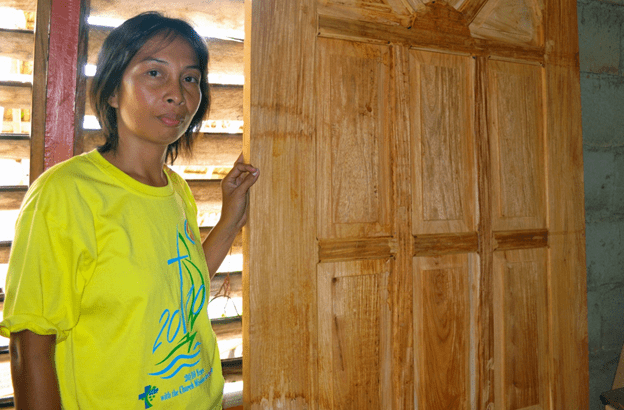Carving a Niche in the Furniture Industry

Juvie Baria of Malilipot, Albay manages a furniture-making enterprise with woodcraft and a sari-sari (variety goods) store on the side. “My husband, Marwen, makes the furniture; I handle sales and marketing and financial management for the business,” shares Juvie. Marwen initially made furniture for the family’s use, a skill he learned from his father. Friends and customers of the store would admire his workmanship and urge him to make similar furniture for them. This led to the birth of the furniture-making enterprise in 2007 with an initial capital of Ten Thousand Pesos (PhP 10,000) which Juvie borrowed on her second loan cycle from SEDP.
“We were brave to start the business with such small capital. Financial difficulties hounded us in the early years of the business. On top of the limited capital, we also experienced, on many occasions, delays in payment on delivered furniture. Instead of giving up, we considered these challenges as opportunities to sharpen our entrepreneurial skills. The challenges helped us to better understand the business and to come up with improved ways to run it. In our lowest moments, when our applied solutions were not bringing in immediate and urgent results, we prayed and drew strength from God. It also helped that we had each other—my husband and I, to share in carrying the burden,” says Juvie.
The business thrived with the care and attention poured into it. It has since grown in assets to more than a quarter million pesos consisting of revolving capital, raw materials, equipment and a motorized boat for transporting the finished products to the mainland. Despite the island location of the wood working shop, good quality wooden furniture attracts regular buyers who come all the way from Baguio, Laguna and Metro Manila. Every month for some time now, they serve an order of folding chairs valued at Sixty Thousand Pesos (PhP 60,000). To fulfil the job order for folding chairs, the business contracts the services of two men who are paid per unit of work completed and provided free board and lodging.
Juvie has formally registered the business with SEDP’s networking assistance. This enables her to display and sell furniture at the Orgullo Kan Bikol (Pride of Bicol) Showroom in Legazpi City which is a tourist hub of the region. The showroom is run by the local government unit to support talented and promising local entrepreneurs who make good use of local resources and contribute to the growth of the local economy. Juvie recalls, “I grew up poor in a community filled with poor families. I thought that poverty comes to each one, like a twin, at birth. In order to leave it behind, one has to strive and work hard. This is exactly what I did. I completed my education and obtained a degree in hotel and restaurant management. I helped establish and co-manage a profitable family business that allows us to live in comfort with two houses — in my island home village and in the mainland in Tabaco City, where our son attends a private school. My formula for success comprises four elements: 1) faith in God, 2) family cooperation and unity, 3) hard work, and 4) perseverance.”